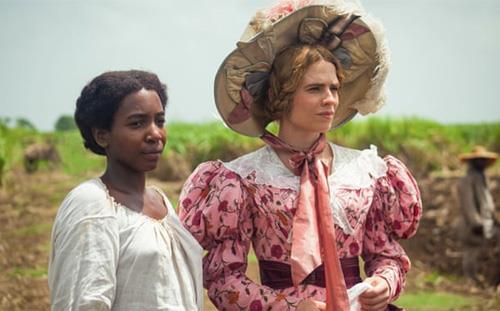
The Long Song, which premieres Sunday at 10 p.m. ET as part of the PBS Masterpiece series (check local listings), throws no filmy gauze over the inhumanity of slavery.
The intense three-night production dramatizes Andrea Levy's novel of the same name, loosely built around the final years of slavery in 19th century Jamaica.
The story focuses on a woman named July (Tamara Lawrance), who is born into slavery. A mature July serves as the narrator, often describing the events she has witnessed with poetic and philosophical twists.
While we see the tale from July's perspective, The Long Song gives equal prominence to Caroline Mortimer (Hayley Atwell), owner of the plantation where July is, uh, employed.
Purely as a character, Caroline is the most fascinating presence in The Long Song because she's the one whose whole way of thinking is most starkly challenged in the course of the story.
The slaves, including July, stay on a more consistent track. What has been done to them is an abomination, yet there is often so little they can do about it. Many slaves keep their heads down and try to find consolation in the few pleasures they are allowed, whether that is singing or the comfort of family.
This does not mean they see themselves as hopeless victims or that, as the plantation owners confidently declare, they do not have the mental capacity to assess their situation and rise up.
Around Christmas 1831, urged on by an abolitionist Baptist minister named Samuel Sharpe, tens of thousands of Jamaica's estimated 300,000 slaves refuse to work. Not surprisingly, what was conceived as a peaceful protest turns violent when slave owners immediately launch lethal repression.
The superior firepower of the plantation owners, backed by the British Army, quells the uprising within two weeks. Reprisals are swift and brutal. They are also, to July, very personal.
Caroline, meanwhile, starts the story as a caricature of the entitled, self-centered, oblivious white mistress of an enterprise run entirely on the unpaid labor of black slaves.
She sees young July, not yet a teenager, walking with her mother. Caroline decides the young girl is cute and that she will take her to be groomed as a lady's maid – a casual whim that wrenches the young girl out of her mother's life forever since her mother is a field slave and not allowed near the manor house.
As a final touch of heedless cruelty, Caroline decides July will now be called Marguerite.
Life as Caroline knows it, however, ends in 1833, when the repercussions of the Christmas Rebellion become the final push for Britain to abolish slavery, at home and in the colonies.
Facing Plantation Life 2.0, Caroline hires an overseer, Robert Goodwin (Jack Lowden), who becomes a presence in her and Marguerite/July's life.
True to the way the world works, the abolition of slavery produces no instant happy ending. July's and Caroline's lives have a number of turns still to take, making The Long Song an accurate title.
Levy paints slavery and its aftermath, at times, in stark, depressingly accurate black and white, while at other times, she pokes through the complexities it reflected and created.
The 2018 BBC production shows DNA from Roots, The Color Purple, and Gone with the Wind. It sends us into Black History Month with the never redundant reminder that there are many parts of history we should never forget.